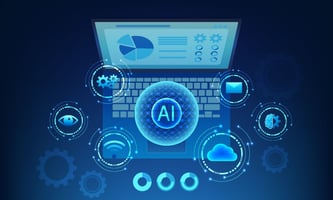Property Management
How AI and Proptech Are Revolutionizing Property Management
Property Management
The Rise of AI in Property Management
The property management industry is experiencing a paradigm shift, largely driven by integrating artificial intelligence (AI) within property management software. As a pivotal force, AI transforms how property managers operate, handle tasks, and interact with residents. By automating routine tasks such as rent collection, work order management, and maintenance requests, AI enhances operational efficiency and allows property managers to focus on more strategic initiatives. These automated processes streamline workflows and ensure that resident issues are addressed promptly, significantly enhancing resident satisfaction.
AI's impact extends beyond automation. It offers property managers deep insights by analyzing extensive datasets related to resident behavior, market trends, and property performance. This data-driven approach empowers managers to make informed decisions about pricing strategies, marketing efforts, and even resident retention.
By predicting resident turnover rates, AI tools enable property managers to implement proactive retention strategies, ultimately maintaining high occupancy levels. As AI continues to evolve, its role in property management is expected to expand, ushering in more sophisticated and nuanced solutions.
Automating Routine Tasks for Efficiency
The introduction of AI into property management software promises enhanced efficiency through automation. Routine tasks that were once time-consuming and labor-intensive can now be handled swiftly and accurately by AI systems. For instance, the automation of rent collection reduces administrative burdens and minimizes the risk of late payments, thereby improving cash flow. AI-driven chatbots can even manage inquiries and maintenance requests, ensuring residents receive timely responses and solutions and enhancing overall satisfaction.
Beyond these immediate benefits, AI also contributes to optimizing work order management. AI systems can:
- Prioritize maintenance tasks based on urgency and resource availability, ensuring that critical issues are addressed first.
- Reduce response times and increase operational efficiency.
- Categorize and sort resident communications, providing quick, personalized responses that improve resident-manager interactions.
Enhancing Resident Satisfaction through Smart Technologies
In today's competitive real estate market, resident satisfaction is paramount. Smart technologies are at the forefront of enhancing the resident experience by offering convenience, security, and energy efficiency. Devices like smart thermostats, lighting systems, and security cameras allow residents to control their living environments easily, often leading to reduced utility costs and increased satisfaction.
Another form of smart technology is using mobile apps and online portals in property management software. These digital solutions streamline operations and foster a sense of community and transparency by enabling residents to access services anytime and anywhere. They provide residents with a convenient platform to pay rent, submit maintenance requests, and communicate with property managers.
Data-Driven Insights for Strategic Decision Making
Property managers can craft strategic decisions regarding pricing, marketing, and maintenance by systematically collecting and analyzing resident behavior, market trends, and property performance data. Advanced analytics platforms offer real-time insights and predictive capabilities that allow property managers to anticipate problems before they occur and optimize operations accordingly.
These data-driven insights are invaluable for making informed decisions that enhance efficiency and profitability. For example, property managers can analyze resident turnover patterns to identify potential issues and implement retention strategies to maintain occupancy levels.
Furthermore, data analytics can inform marketing strategies by identifying target demographics and preferences. As data analytics tools become more sophisticated, their impact on the property management industry will undoubtedly grow, paving the way for more strategic and informed decision-making processes.
The Role of Cloud-Based Solutions in Modern Property Management
Cloud-based solutions within property management software allow property managers to access essential data from any location, on any device, at any time, making them particularly advantageous for those managing multiple properties across different regions. This ensures critical information is always within reach, facilitating efficient and effective property management.
Increased Security
Moreover, cloud-based platforms provide robust security features to protect sensitive data and ensure compliance with privacy regulations. These solutions' integration capabilities are equally noteworthy, as they enable seamless connectivity with other software systems like accounting, CRM, and IoT devices.
This interconnected ecosystem promotes efficiency and streamlines operations, making cloud-based solutions indispensable in modern property management. By leveraging these technologies, property managers can enhance their operational capabilities and deliver better resident service.
Exploring Virtual and Augmented Reality for Immersive Tours
In part, due to the pandemic, demand for remote property management solutions (like AR/VR) has been on the rise. These technologies enable interactive virtual tours and 3D property walkthroughs. For potential residents, engaging property showcases that can be explored anywhere in the world provide a convenient and immersive experience. This broadens the pool of potential residents and reduces the need for on-site visits and property preparations, leading to significant cost savings.
Virtual staging is another innovative application of AR/VR, allowing property managers to showcase properties with customizable layouts and designs. This flexibility enables potential residents to visualize different configurations and personalize the space to their preferences, enhancing their decision-making process.
As AR/VR technologies continue to evolve, they promise to reshape the property management landscape by providing innovative solutions that enhance resident experiences and streamline operations.
Blockchain and Secure Property Transactions
Blockchain technology provides an immutable record of transactions, ensuring that all parties have access to accurate and verifiable information. Blockchain's ability to facilitate secure transactions is particularly valuable in property management, where transparency and trust are paramount.
Integrating blockchain with property management systems offers numerous benefits, including:
- Reduced transaction times and costs
- Enhanced security
- Improved transparency.
- Reduced errors and fraud.
As the real estate industry continues to adopt blockchain technology, its impact on property management is expected to grow. It offers innovative solutions that enhance efficiency and trust.
Sustainability and the Future of Property Management
Driven by rising environmental concerns and regulatory requirements, sustainability is becoming increasingly important in property management. As the industry evolves, property managers must adopt eco-friendly technologies and practices to meet these demands and attract environmentally conscious residents.
For example, property managers can offer things like energy-efficient appliances, renewable energy sources, and waste reduction initiatives.
This is particularly important as residents increasingly seek properties that align with their environmental values. Offering more sustainable features can be a significant differentiator in a competitive market.
Stay Ahead of the Curve
The property management industry is undergoing a transformative shift driven by AI and proptech innovations. These technologies are revolutionizing how property managers operate, enhancing efficiency, improving resident satisfaction, and providing innovative solutions for remote property management.
Property managers must embrace these advancements as the industry continues to evolve to stay competitive and deliver exceptional service to residents. The future promises even more exciting developments, making it an exciting time for those in the industry to adopt and adapt to these changes.
You can request a demo at any time to learn more about how property management software from ExactEstate helps property managers in the multifamily and affordable housing industries stay ahead of the curve. If you are interested in reading more like this, subscribe to our blog.


